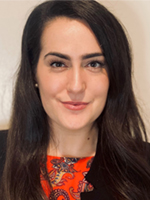April Borawski discusses how she successfully navigated her professional environment to gain trust, confidence and build a professional network of allies to give her sound advice.


April Borawski
Portfolio Manager

Tell me how you got to your current position.
I graduated from Northeastern University in 2015 located in Boston, Massachusetts where I studied international business with a concentration in finance and a minor in Spanish. As part of that programme I had three co-op placements for six months each – cooperative educational experiences where you get full-time work as part of your degree programme. The third co-op I went on was with State Street Global Advisors where I worked on the strategy team as a Fixed Income Portfolio Specialist Co-op. It was a wonderful opportunity because I was still studying at Northeastern, yet was able to have this real world experience in what would ultimately become my career. My co-op experience eventually turned into a full-time role as a Fixed Income Specialist at State Street Global Advisors. During my time on the team, I met some incredible colleagues who became cherished mentors, and really opened my eyes to the complex and dynamic world that is fixed income, and I absolutely fell in love with it.
Following my time on the Strategy team, I was hired onto the global cash team as a Portfolio Manager and Trader on the Government side (US Treasuries and Agencies). I have been on the team for about two and a half years now and it has been a very rewarding experience. I have made some valuable connections and have really been able to sink my teeth into the fundamentals of cash, which are truly the building blocks of most financial markets.
How have you seen the conversation that we are having around inclusion and diversity evolve?
From where I sit, I think there is increasingly more awareness around diversity and inclusion in the workplace, and consequently safe spaces to have these conversations. Personally, if I am in a group setting and a comment arises that could be interpreted as being biased, I feel more comfortable speaking up and saying something. There continues to be more acceptance and awareness around the topic, which is essential in creating a foundation for these conversations; conversations of which we need to continue to have.
What advice would you give to women in finance in terms of establishing and developing a career?
I volunteer with my alma mater – Northeastern – with their Women in Finance group, and am frequently asked what classes the students should be taking or publications they should be reading in order to be more prepared to move over to the portfolio management side of the business. I like to remind students that upon graduation, the most valuable skills you can offer to an employer are more soft skills, such as attention to detail and enthusiasm. My experience has been that once you show an employer or colleague that they can rely on and trust you, they will be more than happy to take the time to train you and teach you the hard skills you need to be successful on the job.
For example, if someone comes to you with a task, they have to know that you will complete it effectively, correctly and with humility. By humility I mean, having the confidence to ask the right questions and admit when you need additional clarification. Once you’ve created that trust, the level of responsibility continues to increase, as does the time colleagues spend with you, teaching and training you. You want to be someone who is worth their investment from a time perspective, so it is on you to show them how you can add value. As you continue to create that trust, more and more opportunities will open up.
What more can women do to make their voices heard within their organisation?
For me personally, in order to feel that my voice is heard, or to have more confidence in speaking up, I think it is important to create a community of people that you trust, both internal and external to the workplace. It is important to have safe places to have honest and thoughtful conversations and to get different perspectives and opinions that offer a more balanced approach. You then get to see different management styles, leadership styles, learning styles, and personalities. This is something I have focused on so that I don’t get siloed into one thought process. From having these varying perspectives and experiences, I can then see what I personally want to incorporate into my career and working style, by taking what resonates with me the most.
What is your motto in life, or your greatest inspiration?
This is probably a common response to this question, but my greatest inspiration is my mother, who I have a very close relationship with. Any time she has faced a challenge or any kind of adversity in her life, she has taught herself to view that challenge as an opportunity.
There have been multiple occasions when she truly has reinvented herself. In her 40’s she went to medical school to become a Physician Assistant, of which she was for over a decade. Later, she came out of retirement to become a flight attendant because she wanted to travel the world. As she sees it, any time one door closes, she is absolutely convinced that that door was not meant for you, and that an even better one will open. She has taught me that you can be many things in this life, as long as you set your mind to it and keep moving forward. When my mother wakes up in the morning, she genuinely thinks each and every day is going to be a rewarding and fulfilling day. And if my mother is ever not satisfied, she will be proactive, advocate for herself, and make a change – she works at and chooses to be happy and present every day. I think we all can admire that determination.